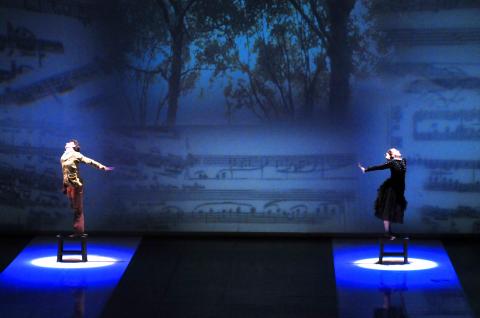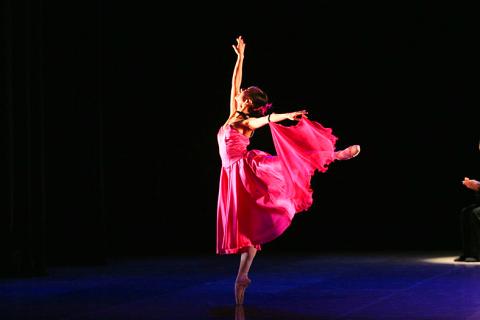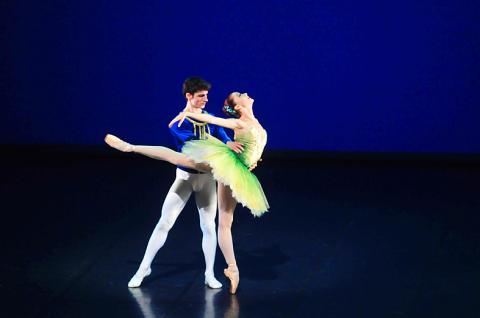Chamber Ballet Taipei’s (台北室內芭蕾舞團) founder and artistic director Allen Yu (余能盛) has returned to his favorite muse for this year’s annual production, Peter Tchaikovsky.
The Austria-based Taiwanese choreographer has frequently said that he loves the 19th-century Russian composer’s music for its combination of romance and sadness, and because it provides him “with limitless imagination.”
That imagination has been put to use in Romance — The Music and The Destiny of Tchaikovsky (羅曼史~柴可夫斯基的音樂與人生), which will be performed in Taipei’s Metropolitan Hall this weekend and in Tainan the following weekend.

Photo courtesy of Chamber Ballet Taipei
To give the full experience of the two Tchaikovsky pieces used in the production, the company will be performing in Taipei with the Taipei Symphony Orchestra (台北市立交響樂團) under the baton of Dutch guest conductor Antony Hermus — who has worked with the company twice before — and with the Taiwan Soloists Symphony Orchestra (台灣獨奏家交響樂團) in Tainan under the baton of Hsiao Pang-hsing (蕭邦享).
The 25-member cast includes two foreign guest artists, both soloists with the Romanian National Ballet.
Although Yu has used Tchaikovsky’s life as the basis of previous productions, such as Tchaikovsky — None But the Lonely Heart and When Ballet Meets Tchaikovsky, in a telephone interview on Monday he said this time he wants to use the music to show the composer’s background, and why he wrote the music that he did.

Photo courtesy of Chamber Ballet Taipei
Yu has read several biographies of the great composer as well as the correspondence between Tchaikovsky and his patron, Nadezhda von Meck, who supported him for 13 years, though on the condition that they never meet.
“His love was a real story. I can’t believe that such a relationship [with von Meck] could exist … Most of his music was for her, in his letters he talked about ‘my pleasure to write this music for you,’” Yu said.
Romance is divided into two parts. The first uses Serenade for Strings in C, Op.48, which has long been a favorite of choreographers such as George Balachine, and the second half is danced to Violin Concerto in D Major,Op.35.

Photo courtesy of Chamber Ballet Taipei
For the serenade section, Yu returns to a metaphor that he has used before on stage — the birdcage, with dancers trapped inside unable to get out.
“There are two couples, one physical and one spiritual,” he said.
For the Violin Concerto Yu changes the perspective to that of the composer himself, given how personal the piece was for Tchaikovsky and what an effect it had on him.

Photo courtesy of Chamber Ballet Taipei
“He only wrote one, no one [violinist] wanted to play it, and there was a lot of criticism when it finally was played. He never wrote another,” Yu said, adding that it was now considered one of the four greatest concertos for the violin ever written.
The violin solo will be performed in Taipei by a young man, Tseng Yu-chien (曾宇謙), who began studying the violin at age three and has won several international competitions. For the Tainan performances, the soloist will be Tsai Cheng-han (蔡承翰).
Yu’s enthusiasm and passion for Tchaikovsky is palpable, even in his program notes for the show.

Photo courtesy of Chamber Ballet Taipei
“By writing the Serenade and Violin Concerto, his music brought people boundless dreams, making choreographers want to use the human body to express that kind of special feeling on the dance stage,” Yu wrote.
While the six-year-old Chamber Ballet only comes together each summer for one production — it is all the time Yu can take away from his main job as deputy ballet director and choreographer at the Opera House in Graz — the shows have been getting stronger each year and Romance holds great promise for another terrific production.

As Taiwan’s second most populous city, Taichung looms large in the electoral map. Taiwanese political commentators describe it — along with neighboring Changhua County — as Taiwan’s “swing states” (搖擺州), which is a curious direct borrowing from American election terminology. In the early post-Martial Law era, Taichung was referred to as a “desert of democracy” because while the Democratic Progressive Party (DPP) was winning elections in the north and south, Taichung remained staunchly loyal to the Chinese Nationalist Party (KMT). That changed over time, but in both Changhua and Taichung, the DPP still suffers from a “one-term curse,” with the

Jan. 26 to Feb. 1 Nearly 90 years after it was last recorded, the Basay language was taught in a classroom for the first time in September last year. Over the following three months, students learned its sounds along with the customs and folktales of the Ketagalan people, who once spoke it across northern Taiwan. Although each Ketagalan settlement had its own language, Basay functioned as a common trade language. By the late 19th century, it had largely fallen out of daily use as speakers shifted to Hoklo (commonly known as Taiwanese), surviving only in fragments remembered by the elderly. In

William Liu (劉家君) moved to Kaohsiung from Nantou to live with his boyfriend Reg Hong (洪嘉佑). “In Nantou, people do not support gay rights at all and never even talk about it. Living here made me optimistic and made me realize how much I can express myself,” Liu tells the Taipei Times. Hong and his friend Cony Hsieh (謝昀希) are both active in several LGBT groups and organizations in Kaohsiung. They were among the people behind the city’s 16th Pride event in November last year, which gathered over 35,000 people. Along with others, they clearly see Kaohsiung as the nexus of LGBT rights.

In the American west, “it is said, water flows upwards towards money,” wrote Marc Reisner in one of the most compelling books on public policy ever written, Cadillac Desert. As Americans failed to overcome the West’s water scarcity with hard work and private capital, the Federal government came to the rescue. As Reisner describes: “the American West quietly became the first and most durable example of the modern welfare state.” In Taiwan, the money toward which water flows upwards is the high tech industry, particularly the chip powerhouse Taiwan Semiconductor Manufacturing Co (TSMC, 台積電). Typically articles on TSMC’s water demand